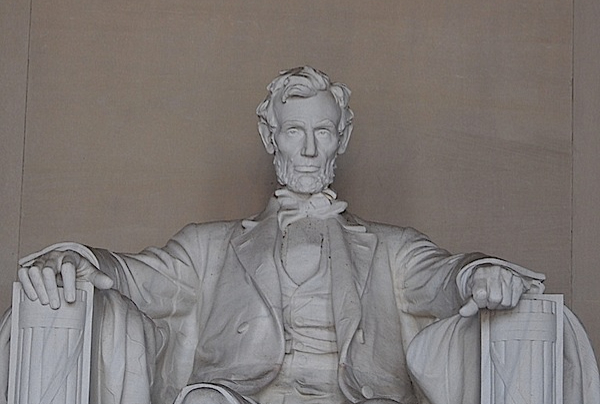Civilization
From Bruce Catton to the War on Terror
Historian Bruce Catton treated men who came home from an earlier war – the War Between the States. They suffered the same problems as today.

What follows is an excerpt from Carl M. Cannon’s foreword to River City One: A Novel by John J. Waters. This selection is part one of two excerpts on how Americans come home from war.
Sixty years before John Waters sat down to write a novel to help make sense of his military service in Iraq and Afghanistan, historian Bruce Catton prefaced his seminal Civil War trilogy by explaining his own fascination with the soldiers who fought in “Mr. Lincoln’s Army.”
In his boyhood in rural Michigan just after the turn of the twentieth century, Catton had known some of these aged Union army veterans. After returning to their farms and villages in the time before the automobile, most of them never again ventured even 50 miles from their homes. And nothing that happened there fazed them or interested them very much. All that was real had taken place when they were young, Catton wrote of the men who lived out their lives expecting to eventually be reunited with their lost comrades.
This is not as morbid as it sounds to modern ears in our more secular age. The veterans of the Michigan Brigade and other storied Civil War fighting units across the North—and in the South—were sufficiently steeped in the old-time religion to believe unquestioningly that upon death, they would be rejoining old friends and resuming ways of living they had known long before. The concept of an afterlife aside, hero worship and idealized tales about marching off to war were reinforced in annual parades and ceremonies in the reunited USA, just as they are today. Ostensibly, these rituals exist to honor those willing to die for their country and in that sense are certainly fitting.
Yet, their other purpose is to induce heroic imaginings among young citizens who are the fodder for future wars. As such, they obscure a grim truth: “War, obviously, is the least romantic of all man’s activities,” Bruce Catton wrote, “and it contains elements which the veterans do not describe to children.” Yet, we return to it again and again and again.
The unprecedented carnage of the First World War, which began when many Civil War veterans were still alive, undermined the notion that there is anything noble about deploying modern armies across from each other on killing fields. Nor did “the war to end all wars” deliver on its promise. It did, however, produce a grim new phrase: “shell shock.” By the time of the Second World War, the U.S. government recognized this condition for what it was, and in typical military fashion gave it an acronym: CSR. This stood for Combat Stress Reaction. It was universally known as “battle fatigue.”
Today, we understand that post-traumatic stress disorder is not limited to veterans, although among those who have seen combat, PTSD is so prevalent as to be the norm. In other words, it’s a mentally healthy reaction to war, if one doesn’t mind a little irony with his Freud. Yes, it was the famed Austrian psychoanalyst who first delved into survivor’s guilt—after the death of his father. Contemporary clinicians have diagnosed it in those who’ve suffered trauma ranging from sexual assault and contracting AIDS to surviving the Holocaust and dodging airplane crashes or lung cancer. A landmark 1991 study concluded that 46 percent of Vietnam War veterans suffered from some level of PTSD. One third of them had contemplated or attempted suicide. Is this because of the nature of that particular war? When PTSD received attention in the early 1980s, many people thought so. “Bad war, bad outcome, bad after-effects,” military historian Thomas Childers noted succinctly.
Exploring PTSD is not really John Waters’ objective in the story that follows, however. But the psychological reactions of American soldiers, sailors, and marines in Vietnam are relevant again for the simple reason that in Afghanistan (like Vietnam), the United States military did not prevail. Likewise, this book is not about any political factors that may have hindered the U.S. military effort, now or then. That said, the self-defeating feature of calling the current struggle the “War on Terror” is palpable. The very name implies that victory is elusive, the mission never-ending.
This article was originally published by RealClearHistory and made available via RealClearWire.
Carl M. Cannon is the Washington Bureau Chief of RealClearPolitics and Executive Editor of RealClear Media Group. Carl is a past recipient of the Gerald R. Ford Journalism Prize for Distinguished Reporting and the Aldo Beckman Award, the two most prestigious awards for White House coverage. Previous positions include executive editor of PoliticsDaily.com, D.C. bureau chief for Reader's Digest and White House correspondent for both the Baltimore Sun and National Journal. He was a 2007 fellow-in-residence at Harvard University's Institute of Politics, a past president of the White House Correspondents’ Association, and is a published author.
-

 Accountability2 days ago
Accountability2 days agoWaste of the Day: Principal Bought Lobster with School Funds
-

 Constitution2 days ago
Constitution2 days agoTrump, Canada, and the Constitutional Problem Beneath the Bridge
-

 Executive18 hours ago
Executive18 hours agoHow Relaxed COVID-Era Rules Fueled Minnesota’s Biggest Scam
-

 Civilization18 hours ago
Civilization18 hours agoThe End of Purple States and Competitive Districts
-

 Civilization4 days ago
Civilization4 days agoThe devil is in the details
-

 Executive4 days ago
Executive4 days agoTwo New Books Bash Covid Failures
-

 Civilization3 days ago
Civilization3 days agoThe Conundrum of President Donald J. Trump
-

 Executive4 days ago
Executive4 days agoThe Israeli Lesson Democrats Ignore at Their Peril






